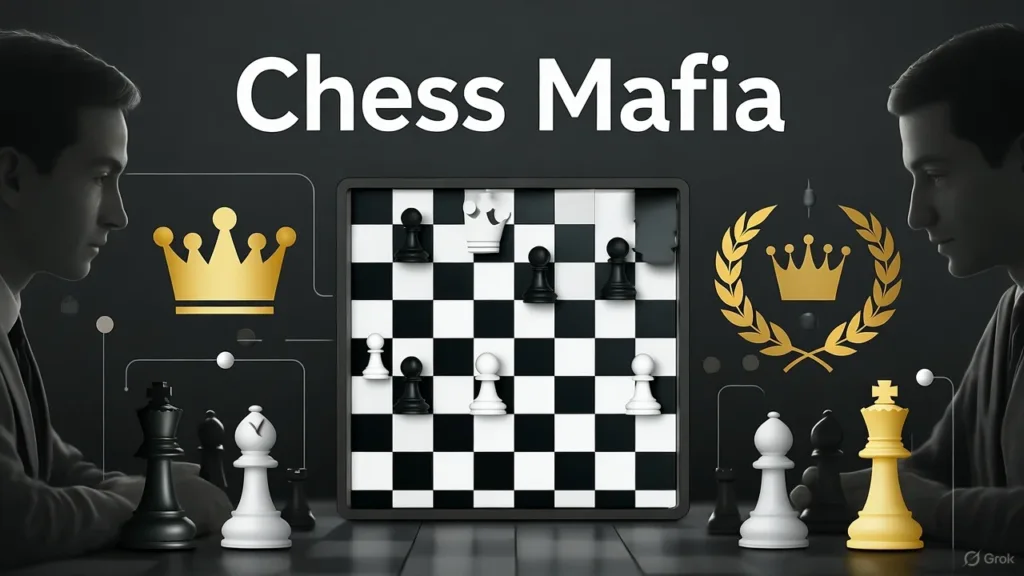The phrase “chess mafia” has appeared frequently in online discussions about modern chess, especially since former world champion Vladimir Kramnik began using it on social media in 2024. The term has no official definition — it’s not a group, nor a proven entity — but rather an expression that reflects frustration over perceived influence and power structures in today’s chess ecosystem.
How the Term Appeared
The first known instance of Kramnik using the hashtag #chessmafia was on May 10, 2024, when he replied to a user on X (formerly Twitter) with:
“On top, @NanaAborabora, you seem to be obsessed by me… Even after I blocked you seeing that. Interesting, #chessmafia.”
He used the hashtag again on June 11, 2024, when discussing his account activity:
“My account was hacked (probably still is) and lots of accounts blocked that I never did… stalemate situation thanks to #chessmafia.”
These posts helped bring the phrase into mainstream chess commentary, and it quickly spread across forums and social-media threads.
Niemann’s Use of the Term
Hans Niemann, a grandmaster who has been involved in major cheating-allegation controversies, also used the phrase “chess mafia” (though not always the hashtag) to describe what he sees as a network of elite players, platforms, and corporate interests dominating the game. For example:
“The chesscom mafia tried to ruin my career because of a similar emotional outburst…” — Niemann (December 2024)
“FIDE is a nonprofit… Meanwhile, the chess mafia talks about ‘growing the game’ but prioritizes their profits above all.” — Niemann (May 2025)
In his usage, Niemann specifically named Magnus Carlsen, Hikaru Nakamura, and Chess.com as being part of the “chess mafia” network, arguing that their influence and commercial interests overshadow the broader community and grassroots development.
What the Term Might Refer To
While there is no verified “mafia” organization in chess, the term is used to encapsulate concerns such as:
- A small number of platforms or brands controlling large portions of online chess content, tournaments and broadcasting.
- Elite players or creators wielding influence over sponsorship, media narratives and tournament invitations.
- A perceived lack of transparency in how allegations (such as cheating) are investigated and how careers are impacted by public accusations.
- A feeling among some players that the “old guard” or commercial interests invite some people in and leave others out.
In short, “chess mafia” is less an accusation of criminal wrongdoing and more a shorthand for power, influence and gatekeeping.
Why It Caused Controversy
For many in the chess world, the label feels unfair or conspiratorial. Critics argue:
- Success and high visibility in chess are often earned, not stolen.
- The platforms and stars mentioned have raised the profile of the game, expanded its audience and created new career paths.
- The term risks undermining trust, making insinuations without evidence, and dividing the community.
On the other hand, supporters of the term say it highlights important structural questions: What checks exist on platforms and personalities? Who gets invited to top events? How are allegations handled?
A Mirror of Modern Chess
In many ways, the debate about “chess mafia” reflects the evolving nature of chess in the digital era. The move from traditional over-the-board tournaments to streaming, influencer culture and platform economics has changed what “success” looks like in chess.
Influence now includes metrics like YouTube subscribers, Twitch followers, sponsorship visibility and brand partnerships — not just Elo rating. For some, this shift means the game they loved is no longer just a test of skill on the board, but a battle for attention, money and algorithms.
What to Remember
- The term “chess mafia” is not an official label but a metaphor used by Kramnik, Niemann and some commentators to describe how they view influence in the chess world.
- It is not a proven conspiracy, but it taps into real concerns about power, transparency and fairness.
- The use of the term by prominent figures has stirred strong reactions: some supportive, some critical, many confused.
- For readers and players, the key takeaway is to separate hype from evidence, to ask critical questions and to value transparency and fairness — regardless of who is at the top.
I’m the senior editor of Attacking Chess, a keen chess player, rated above 2300 in chess.com. You can challenge me or asking questions at Chess.com.

